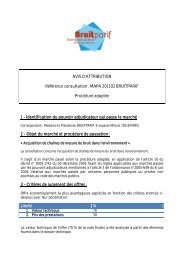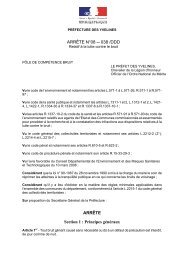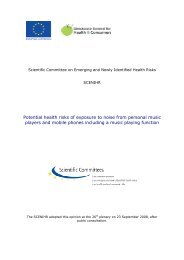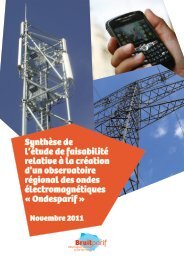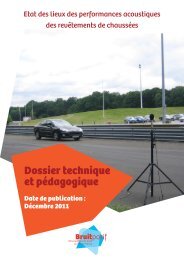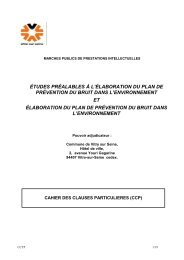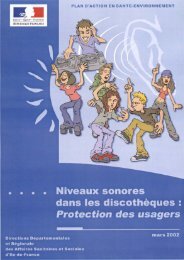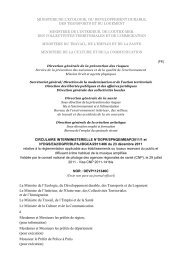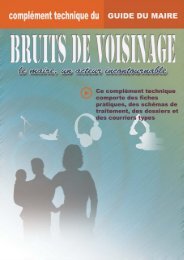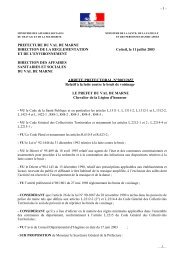Night noise guidelines for Europe - WHO/Europe - World Health ...
Night noise guidelines for Europe - WHO/Europe - World Health ...
Night noise guidelines for Europe - WHO/Europe - World Health ...
Create successful ePaper yourself
Turn your PDF publications into a flip-book with our unique Google optimized e-Paper software.
EFFECTS ON HEALTH<br />
87<br />
people most objected to barking dogs, banging doors, <strong>noise</strong> from radio, television,<br />
or hi-fi and human voices (Grimwood, 1993). In this survey, two types of emotional<br />
response to <strong>noise</strong> were observed: outwardly directed aggression, characterized by<br />
feelings of annoyance, aggravation, bitterness and anger towards the source of the<br />
<strong>noise</strong>, and a more emotional response of tension, anxiety and feelings of pressure.<br />
These responses are reminiscent of the distinction between internalizing and externalizing<br />
disorders. Whether <strong>noise</strong> from neighbours can induce psychiatric disorder<br />
has been little studied in community research, but this is an area that deserves further<br />
study (Stansfeld, Haines and Brown, 2000).<br />
Undoubtedly, prolonged exposure to <strong>noise</strong> can be very upsetting, intrusive and interfering<br />
<strong>for</strong> sleep and everyday activities. In poorly built dwellings, especially apartments,<br />
even low intensity <strong>noise</strong>s may be clearly audible through walls, floors, or ceilings<br />
(Raw and Oseland, 1991). In this situation, <strong>noise</strong> is destructive of privacy, especially<br />
<strong>for</strong> those living alone, and may be associated with perceptions of threat or<br />
increase a sense of isolation. This may be especially the case among people who are<br />
chronically anxious and likely to complain of sensitivity to <strong>noise</strong>; prolonged <strong>noise</strong><br />
exposure may make them more anxious and unhappy. Often, this leads to arguments<br />
with neighbours, leading to a breakdown of neighbourly relationships and further<br />
isolation which may well in itself have a bad effect on mental health. Occasionally,<br />
this may be a sign of feelings of persecution associated with psychotic illness in<br />
which <strong>noise</strong> exposure is just an external trigger of an internally generated condition.<br />
4.8.6 MECHANISMS FOR CAUSAL LINKS BETWEEN NOISE<br />
AND MENTAL HEALTH<br />
What might the mechanism be <strong>for</strong> the effects of <strong>noise</strong> on mental health? One way to<br />
approach this is through the effects of <strong>noise</strong> on cognitive per<strong>for</strong>mance where the laboratory<br />
evidence of effects is fairly robust (Smith and Broadbent, 1992). Effects of<br />
<strong>noise</strong> on mental health might be expected because there is evidence that <strong>noise</strong><br />
impairs other aspects of human functioning, such as per<strong>for</strong>mance (Loeb, 1986) and<br />
sleep, that are important in maintaining normal functioning, and that <strong>noise</strong> causes<br />
adverse emotional reactions such as annoyance. In general, it seems that <strong>noise</strong> exposure<br />
increases arousal, and decreases attention through distraction (Broadbent,<br />
1953), increases the need <strong>for</strong> focusing attention to cut out irrelevant stimuli (Cohen<br />
and Spacapan, 1978), as well as altering choice of task strategy (Smith and<br />
Broadbent, 1981). Even relatively low levels of <strong>noise</strong> may have subtle ill effects, and<br />
in this respect, the state of the person at the time of per<strong>for</strong>mance may be as important<br />
as the <strong>noise</strong> itself (Broadbent, 1983). Individuals’ perception of their degree of<br />
control over <strong>noise</strong> may also influence whether it impairs memory (Willner and<br />
Neiva, 1986) while perception of lack of control over environmental conditions may<br />
be an important mediator of health effects.<br />
Additionally, <strong>noise</strong> may also affect social per<strong>for</strong>mance as: (1) a stressor causing<br />
unwanted aversive changes in affective state; (2) by masking speech and impairing<br />
communication; and (3) by distracting attention from relevant cues in the immediate<br />
social environment (Jones, Chapman and Auburn, 1981). It may be that people<br />
whose per<strong>for</strong>mance strategies are already limited <strong>for</strong> other reasons (<strong>for</strong> instance<br />
through high anxiety) and who are faced with multiple tasks may be more vulnerable<br />
to the masking and distracting effects of <strong>noise</strong>.<br />
The mechanism <strong>for</strong> the effects of <strong>noise</strong> on health is generally conceptualized as fit-<br />
NIGHT NOISE GUIDELINES FOR EUROPE



